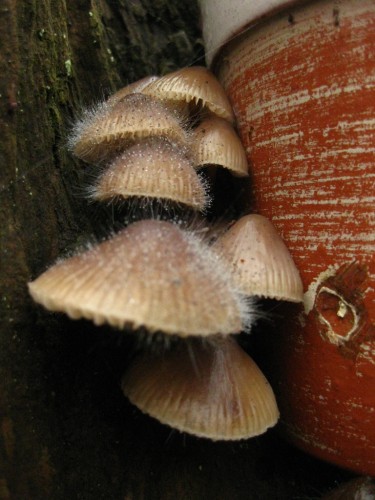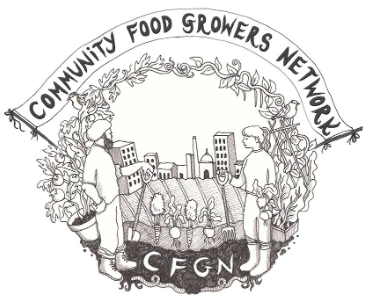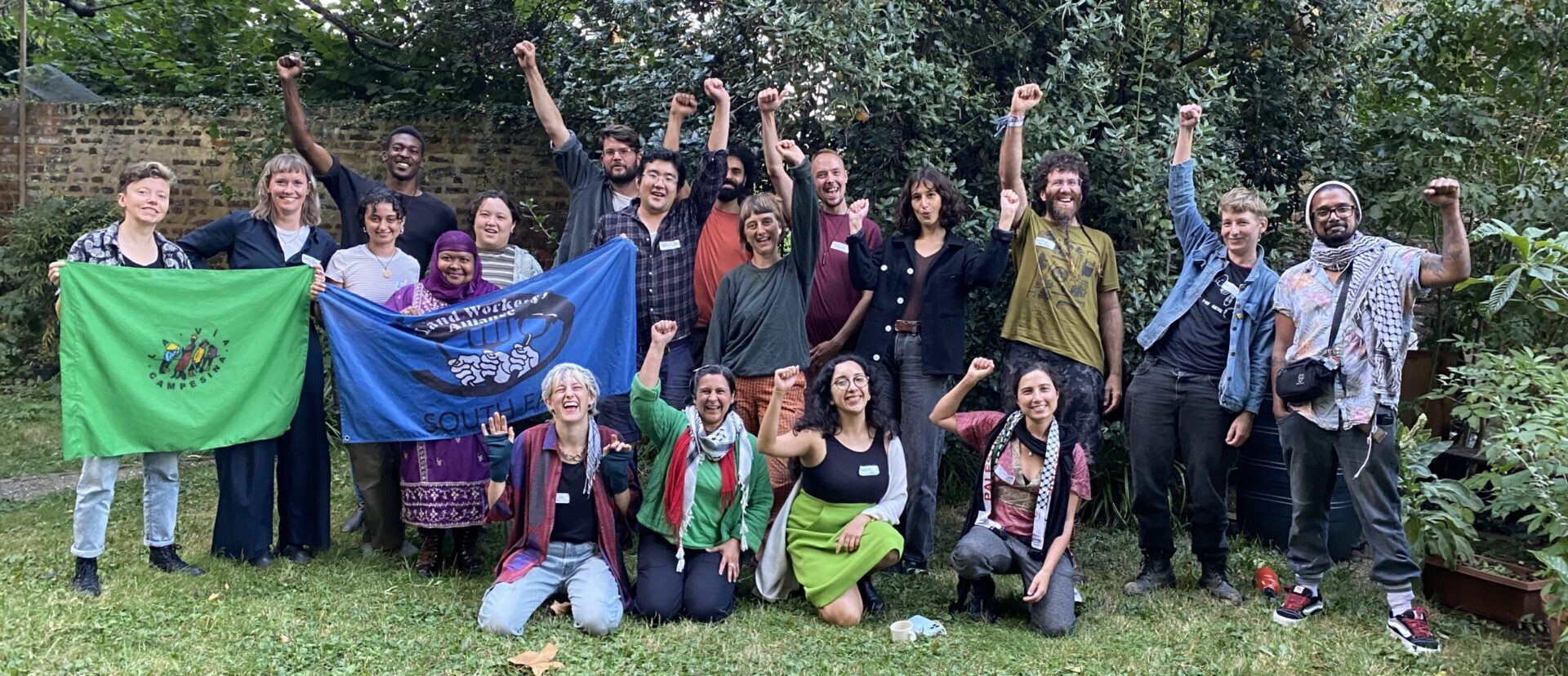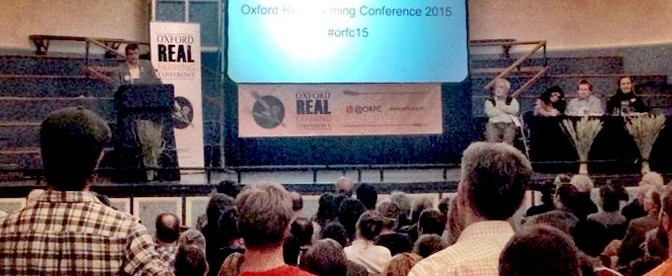Reflections from ORFC
Kindly given permission to re-publish from Abundance Garden blog
This month’s Oxford Real Farming Conference (1) managed to bring together so many different groups and ideas that, at least for me, it is all still taking some time to take it all in. The Conference has sparked many vital conversations which are already crystallising into actions, and inspired in various ways.

What is ‘Real’?
One of the most interesting aspects of the Conference for me was the whole idea of ‘Real Farming’: easily something which could possibly lead into some far-out existential questions, if those attending the event were not so down to earth. The Conference was originally organised in part as an ‘alternative’ to the Oxford farming Conference, held at the same time and even on the same street, though from the beginning the organisers, Graham Harvey (now of Pasture Promise TV) (2), Colin Tudge and Ruth West (founders of Campaign for Real Farming) (3) have made it clear that the event is about practical solutions; “to ask what the world really needs, and what’s possible, and to show what really can be done” (1).
Over the course of the two days many different questions were posed about just what we are providing an alternative to; or even if the Conference could now be seen as such. Who is it who sees ‘conventional’ or ‘normal’ farming as that which involves high-external-input of fossil fuels and agrochemicals; stripping the earth of nutrients and farmers of stability and connection to the land; creating huge wasteful chains of logistics which end up with up to 50% of all food grown being thrown away before it even reaches the shops (4)? As mentioned previously, the UN has recognised that these systems are unsustainable and need to be changed (5); a widely-reported scientific study last year by Dr Jill Edmondson and Professor Nigel Dunnett claims that UK soils have only “100 harvests left” before the soils are so stripped of nutrients that they can no longer support agriculture (6); and partly in recognition of this, the Food and Agriculture Organisation has declared 2015 as the ‘International Year of Soils’ (7) to try to raise awareness of the importance of creating new faring methods.
These are not exactly isolated or niche recognition of the fact that farming can be so much more sustainable than it is. Yet during the Conference, Ben Raskin of the Soil Association commented that in a discussion he was present in the House of Lords recently, someone commented that the UK Department for the Environment, Food and Rural Affairs (DEFRA) “aren’t interested in agriculture” (8).
Er…What?
If agriculture is not of interest to the Department responsible for the environment and food, on which agriculture has a fairly large impact, and of rural affairs, of which agriculture is a part of more or less by definition, it does seem to beg the question of what (if anything) the British government thinks will provide our food in future. Musing on this is probably a futile exercise, however, and it is much more useful to look to where support for real farming is present. One thing which provided another clue as to the more mainstream leaning of the Conference was the venue itself which was the splendidly opulent “venetian palace”, as one delegate called it, which is Oxford Town Hall. So even if central government has no interest in agriculture, it is clear that at least one local government does.
I have to admit it was rather surreal wandering around the carven, fluted halls of the building, passing groups of muddy-booted delegates who were partially obscuring the huge glass cases of official memorabilia, including a giant, golden (not sure if it was real solid gold) mayoral mace. In many ways it was rather fitting that many of the discussions held in the Assembly Room which touched upon the idea that the land is being unnecessarily damaged at the cost of our own health that of the planet were overlooked by a rather sombre, if not downright disturbing, oil painting of the Rape of the Sabines. Possibly more disturbing was the display case proudly exhibiting a ceremonial painted truncheon. I am grateful to Oxford City Council for hosting the Conference, and feel they have a right to do what they like with their building, but cannot help feeling that the citizens of a town which showcases an object whose only purpose is to instil pain and intimidation may need to question their symbols somewhat.
Incongruence makes Wholeness?
Such incongruences were, in a way, present throughout the whole Conference: a sign that healthy debate was going on, as I rarely heard anyone claim to have the whole answer or solution. Indeed, quite the opposite: during one discussion, with the panel from the Square Meal Report (9) when a man commented that the only thing we have to do is “buy organic food and tell everyone else to do the same”, all members of the panel gently deflected this dogmatic approach, with comments such as Mike Clarke, CEO of the RSPB (10) who pointed out that it is better to “keep an open mind” and think about “what do we collectively need to achieve together?”
These sentiments were echoed by many over the two days. Rachel Harries of the Soil Association (11) was chairing a session, ‘Local Authorities and Access to Land’, which went over all of the different ways in which one can go about reclaiming disused land in a legal manner, and showcased two community groups, Organiclea (12) and Sutton Community Farm (13), who have done just this. During the session we learned that as part of UK law all citizens have the right to “reclaim land” which is unused, disused or vacant, by applying to the Secretary of State to do so (14).
Such illuminations (I had not heard of this right before) help to eradicate the idea of “us and them” which, as pointed out by the fact that we were being hosted by the Council, was already rather hazy. It was made clear that though we cannot simply write off local authorities as unhelpful organisations, since they are, after all, made up of people too, it can happen that these people sometimes get “adversarial” when it comes to the crucial question of land. With statistics like the fact that 70% of the land in the UK is owned by just 1% of the population (15), it becomes clear that the more people who are trying to find different ways around these the better.
Coming Together
The Landworkers’ Alliance (16) were present in one room for the whole two days, as part of the ‘New Generation, New Ideas’ strand (17) of the Conference. However, their influence did not stop in the town hall: they also organised a folk concert and ceilidh at the Jam Factory bar (18) on the evening of the first night of the conference. Though this may seem like a small part of the proceedings, for me it represented a significant point. Most people present at the conference are in some way involved in practical projects and though there were many academics I got the feeling that the majority (including myself!) found spending hours and hours sitting, listening and talking a slight strain. The ceilidh provided a space to release some tension and engage in communication which is after all of a deeper kind; that of dancing around with a roomful of total strangers. This energy could even be seen to be carried on into the Conference on the following day. I noticed that, in comparison with the talks I had attended the day before, all the talks on the Wednesday involved more free-flowing conversation, and people seemed more confident with each other and inclined to speak their minds. This could be simply that we had got to know each other by talking; but I feel the dancing was also a big part of it.
Springing up from the Ground
Much of the conference revolved around practical techniques you can engage in if you are already growing, such as seed saving from Ben Raskin, and Kate McEvoy from Real Seeds (19) and soil care from Dr Elaine Ingham of the Soil Food Web (20), and how to influence policy change from and the Landworkers’ Alliance (16) and others. One of the most interesting sessions for me, as a landless landworker, however, was one organised by the newly set-up Groundspring Network (21), the “entrant-level wing” of the Landworkers’ Alliance, designed to help those who wish to begin growing by supporting them and sharing ideas, methods and forums (21). The session focussed on the “rural-urban divide” in the UK which can be seen as putting off existing farmers from changing, and those wishing to get involved in farming to make the jump; when only 3% of farmers here are under the age of 35 (20), addressing the factors surrounding this seem pretty important.
The Groundspring Network are helping people to start growing, as well as linking novices with farmers who can act as ‘mentors’, and providing forums and spaces for new growers to share their experiences. The network is not the only one of its kind; there are many other such organisations in the UK and worldwide designed to help ‘bridge the gap’ between what is often seen as ‘farming’ rural and ‘non-farming’ urban; such as the Federation of City Farms and Community Gardens (22), Farmstart (23) (24) and Reclaim the Fields (25). One new (to the UK) forum being set up is Farmhack (26), already successful in the USA and Canada and which will be officially launched in this country on the weekend of 18 and 19 April (27), with practical workshops, shared food, and fine entertainment: since the event is organised by the Landworkers’ Alliance there will, of course, be a ceilidh, and Topspin Circus (28) shall be contributing mesmeric fire-spinning.
The Importance of Group activities
One of the most exciting things the Conference represented was a networking opportunity for people from a huge diversity of different perspectives: organic, biodynamic, permaculture, ‘pasture power’, low-carbon farming, agroecology; people who work in academia, in the food industry, in campaigning, growing, or decision-making; in wildlife-protection groups and food banks. All coming together shows the recognition that farming is not just about what happens in the fields; as the Square Meal report (9) points out, it affects our health, the health of the planet, the way our jobs are structured, and wildlife and biodiversity. The conversations which have sprung out of the Conference all point to a hopeful future, where we can work together to create more resilient, sustainable and affordable food systems beneficial to humans, animals and the planet. Not to be underestimated as well are the things which went unsaid; the feelings of connection and of support from one another.
This feeling was shared not just by me; as I found out at the Closing Plenary, which was basically a quarter of an hour of thanks being given to all present, especially the hosts, volunteers and sponsors. This is of course an important part of any event, though it began to feel somewhat strained as it kept dragging on. Then Jyoti Fernandes from the New Generation, New Ideas (17) was asked to stand up and speak. We prepared again for another thank-you speech. Instead, she scanned the crowd, locating Robin Grey, the man who had been providing folk-song entertainment for us the previous night, and insisting he come up on stage to lead the whole hall in a group singalong. Such an activity is perhaps not very common in this country anymore (outside of churches and other community groups) so it’s possible that some people in the crowd felt slightly embarrassed at this suggestion. Nevertheless, the power could be felt, no matter how silly it may seem, as we were led in the song which some of us had learnt the previous night, introduced as “the new national anthem, when the revolution comes”:
“Sing John Ball, and tell it to them all
Long be the day that is dawning,
I’ll crow like a cock and I’ll carol like a lark
For the light that’s coming in the morning.” (29)
Who John Ball is, or why he is an important part of this, is a tale for another story. What can be noted now is the importance of such joining activities in helping to create the better world we know is possible and easily achievable. If we are to spread such hope to others perhaps a good way is through interactions such as song and dance; which can appeal to many people at once without having to engage their intellectual (and thus possibly confrontational) mindset. A few days after the conference, I happened to mention to a (non-farming) friend the scientific study which predicts that our soils are so damaged that we only have “100 harvests left” (6). My friend shrugged, and with a laugh, commented, “oh well, at least that’s one hundred years of harvests!”
Such an attitude, though admirable in its optimism, is perhaps symptomatic of the lack of understanding and connection that can be seen in many in our society. Events such as the Real Farming Conference are helping to rebuild the connection, and lead the way to a place where we all care about farming and how it is done because we recognise that it is integral to our lives.
References
- Oxford Real Farming Conference, 2014. ‘About’. http://orfc.org.uk/about/ – retrieved 21/12/14
- Pasture Promise TV, 2015. ‘About’. http://www.pasturepromise.tv/video.php?section=About – retrieved 18/1/15
- Campaign for Real Farming, 2015. ‘About’. http://www.campaignforrealfarming.org/about/ – retrieved 18/1/15
- Institute of Mechanical Engineers, 2012. ‘Global Food: Waste Not, Want Not’. IMechE: London. Available as a PDF here: http://www.imeche.org/docs/default-source/reports/Global_Food_Report.pdf?sfvrsn=0
- UNCTAD, 2013. Wake Up Before It’s Too Late: Make Farming Truly Sustainable Now for Food Security in a Changing Climate. UNCTAD: Geneva. Available as a PDF here: http://unctad.org/en/publicationslibrary/ditcted2012d3_en.pdf – retrieved 04/1/15
- Withnall, A, 2014. “Britain has only 100 harvests left in its farm soil as scientists warn of growing ‘agricultural crisis’”. Independent, 20/10/14.
- FAO, 2015. ‘International Year of Soils’. http://www.fao.org/soils-2015/en/ – retrieved 06/01/15
- Raskin, B, 2015. Comment during ‘The Rural/Urban Divide’ Session, Groundspring Network. Oxford Real Farming Conference, 7/1/15
- Food Research Collaboration, 2014. The Square Meal Report: A Fair and Square Deal for Farming, People, Wildlife and Public Health. Food Research Collaboration: London. Available as a PDF here: http://foodresearch.org.uk/wp-content/uploads/2014/07/squaremealfinalpdf-1.pdf – retrieved 18/1/15
- Royal Society for the Protection of Birds, 2015. ‘What We Do: Overview’. http://www.rspb.org.uk/whatwedo/ – retrieved 18/1/15
- Soil Association, 2014. ‘What Is Organic?’ http://www.soilassociation.org/whatisorganic – retrieved 06/01/15
- Organiclea, 2015. ‘About’. http://www.organiclea.org.uk/about/ – retrieved 06/01/15
- Sutton Community Farm, 2015. ‘About Us’. http://suttoncommunityfarm.org.uk/about-us-sutton-community-farm/ – retrieved 06/01/15
- UK Government Department for Communities and Local Government, 2012 (updated 2014). ‘Community Right to Reclaim Land’. https://www.gov.uk/government/policies/giving-people-more-power-over-what-happens-in-their-neighbourhood/supporting-pages/community-right-to-reclaim-land – retrieved 06/01/15
- UK Land Directory, 2015. ‘Land Usage in the UK’. http://www.uklanddirectory.org.uk/land-usage.asp– retrieved 18/1/15
- Land Workers Alliance, 2014. ‘Who We Are’. http://landworkersalliance.org.uk/organisation/ – retrieved 06/01/15
- Oxford Real Farming Conference, 2015. ‘New Generation, New Ideas’. http://orfc.org.uk/orfc-2015/new-generation-new-ideas/ retrieved 18/1/15
- The Jam Factory, 2015. ‘Welcome to the Jam Factory’. http://www.thejamfactoryoxford.com/ – retrieved 18/1/15
- Real Seeds, 2015. ‘About’. http://www.realseeds.co.uk/about.html – retrieved 18/1/15
- Soil Food Web, Inc, 2015. ‘Home Page’. http://www.soilfoodweb.com/Home_Page.html – retrieved 18/1/15
- Landworkers’ Alliance, 2014. ‘Groundspring Network’. http://landworkersalliance.org.uk/groundspring-network/ – retrieved 18/1/15
- Federation of City Farms and Community Gardens, 2015. ‘About Us’. https://www.farmgarden.org.uk/about-us – retrieved 18/1/15
- Farmstart Canada, 2015. ‘About Us’. http://www.farmstart.ca/about-us/ – retrieved 18/1/15
- Kindling Trust, 2014. ‘Farmstart Manchester’. http://kindling.org.uk/farmstart – retrieved 18/1/15
- Reclaim the Fields, 2015. ‘About Us’. http://www.reclaimthefields.org.uk/about/– retrieved 18/1/15
- Farmhack, 2015. ‘Home’. http://farmhack.net/home/ retrieved 18/1/15
- Landworkers’ Alliance, 2015. ‘Farmhack’. http://landworkersalliance.org.uk/farmhack/ retrieved 18/1/15
- Topspin Circus, 2013. ‘About Us’. http://topspincircus.wix.com/topspin#!about/c10fk retrieved 18/1/15
- Soundclick, 2015. ‘Lyrics: John Ball’. http://www.soundclick.com/bands/_music_lyrics.cfm?bandid=45728&songID=4135061&keepThis=true&TB_iframe=true&height=530&width=530 – retrieved 18/1/15


